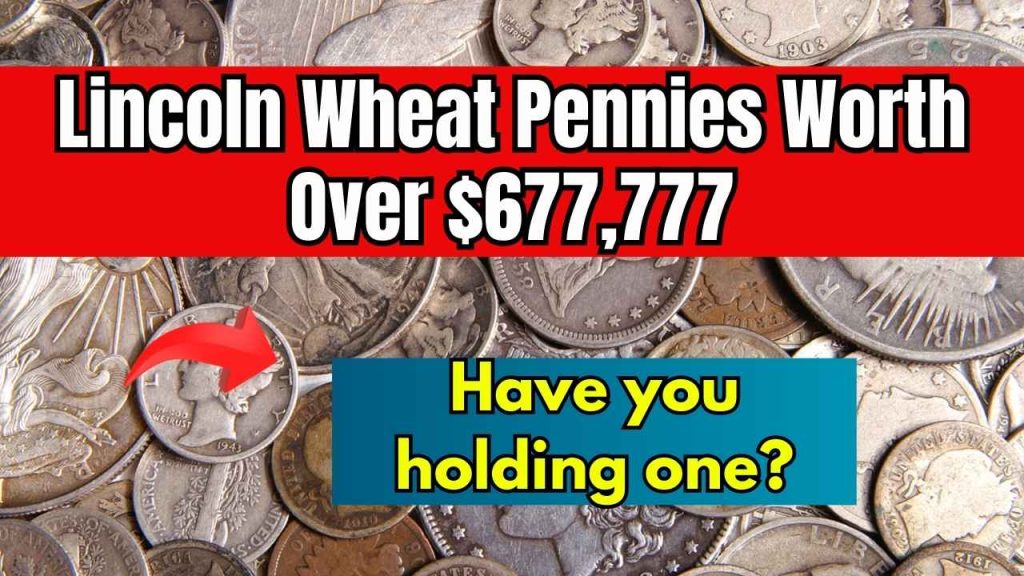Lincoln Wheat Pennies Worth Over $677,777: Imagine the excitement of discovering that an ordinary-looking penny in your pocket change is worth over $677,777! For coin collectors and casual enthusiasts alike, Lincoln Wheat Pennies hold the potential for life-changing value. Some rare pennies, like the 1943-D bronze cent, have fetched jaw-dropping prices at auctions. Could you be holding one of these treasures? Let’s dive into their history, how to identify valuable coins, and actionable steps to sell them.
Lincoln Wheat Pennies Worth Over $677,777
The Lincoln Wheat Penny is a fascinating piece of American history with the potential to turn ordinary pocket change into extraordinary wealth. By knowing what to look for and taking the right steps to authenticate and sell your coins, you might just uncover a hidden treasure in your wallet.

| Coin | Year | Mint Mark | Estimated Value | Notable Features |
|---|---|---|---|---|
| 1943-D Bronze Cent | 1943 | D | Up to $840,000 | Rare error coin; most 1943 cents were steel due to wartime copper shortage. |
| 1958 Doubled Die Obverse | 1958 | None | Up to $336,000 | Features a prominent doubling of the obverse inscriptions. |
| 1944 Steel Cent | 1944 | S | Up to $408,000 | A wartime error; intended to be bronze but struck in steel. |
| 1909-S VDB | 1909 | S | Up to $168,000 | First year of issue with designer’s initials; low mintage. |
| 1914-D | 1914 | D | Up to $158,625 | Low mintage; highly sought after by collectors. |
For official coin grading resources, visit the Professional Coin Grading Service (PCGS).
The History of Lincoln Wheat Pennies
The Lincoln Wheat Penny was introduced in 1909 to commemorate Abraham Lincoln’s 100th birthday. Designed by Victor David Brenner, it was the first U.S. coin to feature a president. These pennies were minted until 1958 and are characterized by their distinctive reverse design: two wheat stalks surrounding the words “ONE CENT.”
Over time, some Lincoln Wheat Pennies have gained incredible value due to errors, low mintages, or unique features. Their historical significance makes them a favorite among collectors worldwide.
Why Are Certain Wheat Pennies Worth a Fortune?
Several factors determine the value of a Lincoln Wheat Penny:
- Rarity: Coins with low mintages or unique production errors are extremely rare and sought after.
- Errors: Mistakes during production, such as double dies or wrong metal usage, make these coins unique and valuable.
- Condition (Grade): Well-preserved coins in mint or near-mint condition fetch higher prices.
- Historical Significance: Coins linked to notable periods, like wartime, carry added value for collectors.
Identifying Valuable Lincoln Wheat Pennies
To determine if your penny is valuable, follow these steps:
1. Check the Date and Mint Mark
Examine the year and the mint mark, located below the date. Key years to look for include:
- 1909-S VDB: The first year of issue, with only 484,000 minted.
- 1914-D: A rare penny with a mintage of just over 1.1 million.
- 1943-D Bronze Cent: A wartime error where pennies were accidentally struck in bronze instead of steel.
- 1958 Doubled Die Obverse: Features doubling on the inscriptions “LIBERTY” and “IN GOD WE TRUST.”
2. Look for Errors
Error coins are highly valuable. Common errors include:
- Doubled Die Obverse: Letters and numbers on the obverse side appear doubled (e.g., 1955 and 1958 pennies).
- Wrong Planchet Errors: Coins struck on the wrong metal, like the 1943 bronze cent or 1944 steel cent.
3. Assess the Condition
Coins are graded on a scale from Poor (P-1) to Mint State (MS-70). Uncirculated coins in pristine condition are the most valuable.
Notable Rare Lincoln Wheat Pennies
1. 1943-D Bronze Cent
During World War II, pennies were made of steel to conserve copper for the war effort. However, a few bronze planchets were mistakenly used, creating one of the rarest coins in U.S. history. Only one known specimen of the 1943-D bronze cent exists, valued at over $840,000.
2. 1958 Doubled Die Obverse
This coin features a noticeable doubling of the obverse inscriptions, with only a few examples known. It has fetched prices as high as $336,000 at auction.
3. 1944 Steel Cent
After the war, pennies were supposed to return to bronze, but a few steel planchets from 1943 were accidentally used. These coins are extremely rare, with some selling for up to $408,000.
4. 1909-S VDB
The inaugural year of the Lincoln cent featured the initials “VDB” of its designer on the reverse. Due to controversy, the initials were quickly removed, making the 1909-S VDB a highly sought-after coin.
How to Authenticate and Sell Lincoln Wheat Pennies Worth Over $677,777?
1. Avoid Cleaning Your Coin
Cleaning a coin can damage its surface and reduce its value significantly. Keep the coin in its original state.
2. Get It Graded
Professional grading services like PCGS or NGC can authenticate and grade your coin, adding credibility and increasing its marketability.
3. Research Market Value
Check recent auction results for similar coins to understand their current value.
4. Choose a Selling Method
- Auction Houses: Reputable houses like Heritage Auctions attract serious collectors.
- Online Platforms: Websites like eBay allow you to reach a global audience.
- Coin Dealers: Engage with professional dealers for direct sales, though prices may be slightly lower.
Tips for Aspiring Coin Collectors
If you’re inspired to start collecting, here’s how to begin:
- Start Small: Begin with more affordable coins to build your knowledge.
- Learn Grading Standards: Understanding how coins are graded is essential for assessing value.
- Join Numismatic Communities: Online forums and local clubs are great resources for learning and networking.
- Invest in Quality Storage: Use coin holders or albums to protect your collection.
Avoiding Scams: How to Stay Safe
The coin-collecting market is not without risks. Protect yourself by:
- Verifying Dealers: Work only with certified dealers and auction houses.
- Insisting on Certification: Ensure coins are graded and authenticated by trusted services like PCGS.
- Avoiding Quick Sales: Be wary of unsolicited offers, especially if the price seems too low.
No More Time Shifts? US Moves Forward on Changes to Daylight Saving Time!
U.S. Government Confirms No SSI Payments in January: Here’s the New Timeline
U.S. Retirees Rejoice: The News You’ve Been Waiting for Has Finally Landed!
Frequently Asked Questions (FAQs)
1. How can I tell if my penny is valuable?
Look for key dates, mint marks, and errors. Consult a professional numismatist or have the coin graded by PCGS or NGC.
2. Are all Lincoln Wheat Pennies valuable?
Not all are valuable. Common pennies in circulated condition are typically worth only face value or slightly more.
3. What is the most valuable Lincoln Wheat Penny?
The 1943-D Bronze Cent is the most valuable, with a single known specimen worth over $840,000.
4. How do I sell a rare penny?
You can sell through auction houses, online platforms like eBay, or professional coin dealers.
5. Can I clean my penny before selling it?
No. Cleaning a coin can damage its surface and significantly lower its value.






